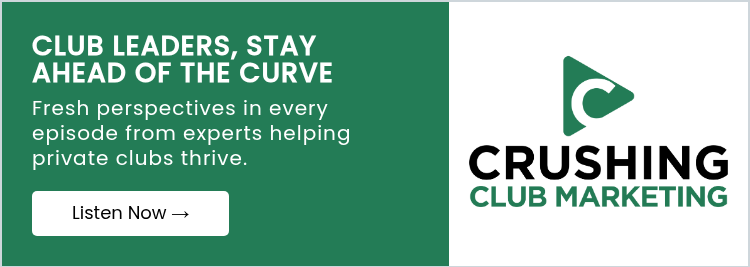One of the most compelling reasons people join private clubs is the personal attention they receive. Your members want to be greeted by name. They expect the staff to remember their preferences. They value the human connection that makes them feel like they belong to something special. It’s also what every club strives to deliver.
This is what should set private clubs apart from every other option available to prospective members. Outstanding amenities are a given. It's personal service and genuine relationships that create member loyalty and drive retention.
So when club leaders hear about artificial intelligence and automation, their guard goes up. And rightfully so. The hospitality business is built on human interaction, and anything that threatens that can feel dangerous.
But what if technology could actually give your staff more time for the moments that matter most?
The Real Problem: Your Team is Drowning in Administrative Work
Most membership directors and GMs accept that operational tasks are simply part of the job. Answering member questions, coordinating communications, tracking activity participation—these things have to get done, and they always have.
But that acceptance doesn't change the reality: when your membership director spends an hour responding to emails and phone calls about guest policies and billing questions, that's an hour she's not spending with a prospective family considering membership. When your team is updating spreadsheets and manually tracking who attended the “Western Night” last week, they're not out on the floor creating the personal connections that make your club special.
The operational work isn't going away. But what if technology could handle more of the routine tasks, giving your team more capacity for the relationships that actually drive member satisfaction and retention?
What HubSpot's INBOUND Conference Revealed
I spent a few days at HubSpot's annual INBOUND conference in September, and while much of the tech world was buzzing about AI agents and automation, I kept thinking about private clubs. Not because clubs need to become tech companies, but because the tools HubSpot is developing could solve some of the most persistent frustrations I hear from club leaders.
AI Assistants for Member Self-Service
Imagine a member’s guest visits your website at 10 PM because they have a question about your guest policy before visiting this weekend. Instead of waiting until tomorrow to call the membership office, they can ask an AI assistant trained on your club's specific policies and get an accurate answer immediately.
This isn't about replacing human interaction. It's about giving members and their guests answers when they need them—even outside business hours—and saving your staff from answering the same questions repeatedly. Your membership director can focus on the conversations that actually require her expertise rather than explaining for the hundredth time how to add a guest to a reservation.
The same concept applies to new member onboarding. New members often have basic questions they're almost embarrassed to ask: Where do I park? What's the dress code for the dining room? How do I book a tennis court? An AI assistant can guide them through these foundational details, while your team focuses on making them feel welcomed and connected to the community. To be sure, if a new member prefers to talk to a “live” human being, that should be available first. But today, not everyone wants to talk to a person and providing an opportunity to get answers quickly and autonomously saves time for everyone.
Understanding What Your Members Actually Care About
Most clubs send regular communications—newsletters, event invitations, dining specials—but they have no idea what's resonating. Which members are opening your emails? Who's clicking on event registrations but not following through? What types of content generate the most engagement?
HubSpot's platform tracks all of this automatically. When you see that certain members consistently open communications about wine dinners but ignore golf tournaments, you can tailor your outreach accordingly. When you notice that younger families engage with weekend brunch announcements but rarely with weekday lunch specials, you can adjust your programming.
This level of insight allows you to be more strategic about how you allocate resources and plan events. Instead of guessing what your members want, you can make data-informed decisions that lead to better attendance and higher satisfaction.
Smarter Membership Pipeline Management
For membership directors juggling a pipeline of prospects at various stages of interest, the enhanced CRM tools powered by AI can be transformative. An AI agent can analyze your contacts and surface the prospects showing the highest level of engagement—those who've attended multiple events, downloaded your membership guide, and asked detailed questions.
This doesn't replace your membership director's instincts and relationship-building skills. It simply helps her prioritize her time. Rather than spending hours manually reviewing spreadsheets to figure out who to follow up with, she gets intelligent recommendations and can focus her energy on the conversations that will be most fruitful.
Pipeline forecasting tools also help the club anticipate trends. If your board is considering an increase in initiation fees, but you’re seeing a decline in inquiry volume or noticing that certain lead sources have dried up, you can offer valuable insight so the board can make an informed decision. This kind of visibility is especially valuable as the industry navigates post-pandemic membership dynamics and potentially declining interest in some markets.
Faster, More Consistent Communications
One of the biggest time drains for membership directors is writing member communications. Every newsletter, every event invitation, every policy update requires thoughtful copywriting that strikes the right tone for your club's culture.
AI assistants can learn your club's “voice” and help draft communications much faster. This doesn't mean you're sending robot-written emails to your members. It means your membership director has a starting point that she can refine and personalize, rather than staring at a blank page every time she needs to announce the holiday party.
The consistency this creates is valuable too. When your communications maintain a recognizable voice and style, it reinforces your brand and makes members more likely to engage with what you're sending.
Technology That Serves Your Mission
The beauty of private clubs is their ability to make members feel valued through personal attention and genuine relationships. That will never change, and it shouldn't.
But the reality is that most club teams are stretched thin. They're managing too many responsibilities with outdated systems that create unnecessary friction. The result is staff who want to deliver exceptional service but simply don't have the time.
The AI tools HubSpot showcased at INBOUND 2025 aren't about replacing the human element of hospitality. They're about removing the barriers that prevent your team from doing what they do best—building relationships and creating memorable experiences.
When your membership director isn't answering the same question for the tenth time this week, she can spend that time with a prospective family giving them a tour. When your team isn't manually tracking who opened last week's newsletter, they can focus on planning events that will genuinely excite your members.
Technology should serve your club's mission, not distract from it. The question isn't whether private clubs should embrace AI and automation. The question is whether you can afford not to—especially if it means your team finally has the bandwidth to deliver the level of service your members joined for in the first place.
Subscribe to Our Blog!

Creating a Sales-Driven Culture in Private Clubs: Breaking Down the Stigma
For years, private clubs have shied away from the term "sales," believing it to be too commercial or at odds with their exclusive reputation. But in...

The GM's Dashboard: 7 Digital Metrics That Actually Predict Club Success
It’s easy for private clubs to fall into a risky pattern - especially in these times when 45% of clubs in America have a waitlist. When membership...
 Ed Heil
Ed Heil

